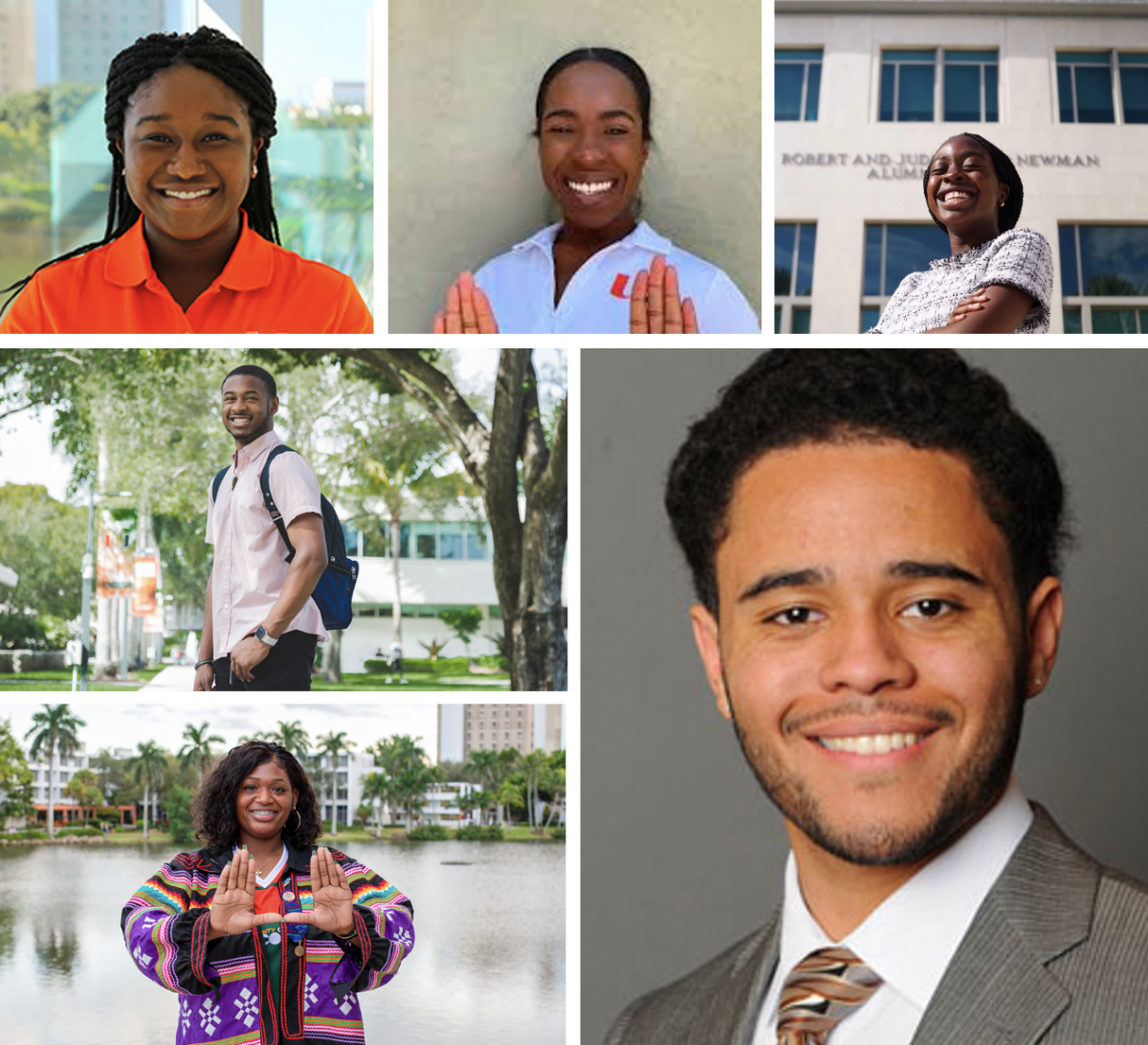
In an effort to spark action, six Black student leaders gathered for a virtual dialogue over Zoom to deliver a Black State of the Union Address and discuss racial issues persisting at the University of Miami.
During the hour-long discussion held Monday, June 8 and presented by the Black Student Leadership Caucus in collaboration with the Office of Multicultural Student Affairs, student leaders presented tangible changes they say the university must make to ensure that campus becomes a safe, welcoming space for all students, especially Black students.
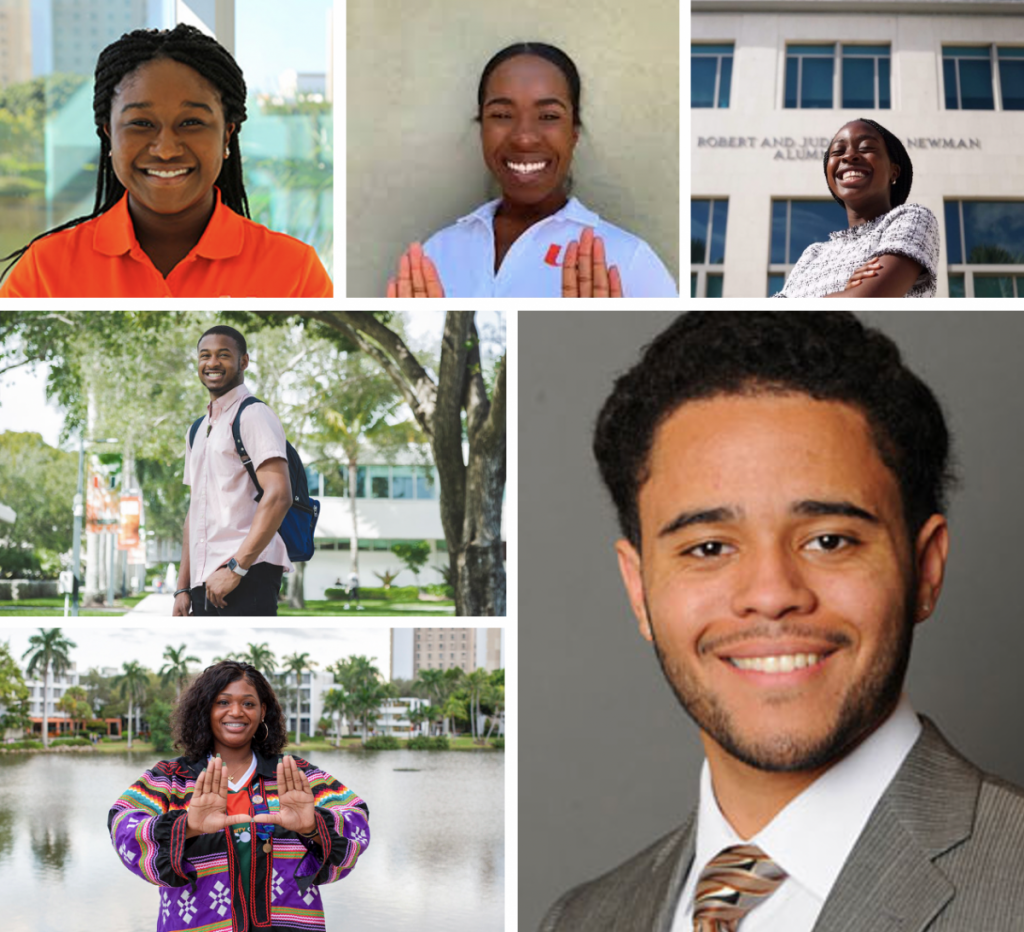
Moderated by the UM NAACP president, Miles Pendleton, the panel included Landon Coles, president of United Black Students; Abigail Adeleke, Student Government president; Doreen Gustave, president of The President’s 100; Zoria Telfare, chairwoman of the Homecoming Executive Committee; and Cachay Byrd, chief of Iron Arrow Honor Society.
Through individual speeches and moderated discussions, the panelists honored the lives lost at the hands of police brutality and also shared their personal experiences as Black students at UM, demanding changes within the Cane community.
The event reached 230 viewers, with several top administrators in attendance, including Patricia Whitely, vice president for student affairs; Christopher Clarke, director of Multicultural Student Affairs; and Renee Dickens Callan, executive director of student life.
Here are six takeaways from Monday night.
1. UBS president addressed implicit biases within the university and offered solutions for change.
2. SG president shared three demands for the administration: more Black faculty and staff, diversity and sensitivity training and a campus-wide survey.
3. Iron Arrow chief urged the university to expand policy and procedure for racially biased incidents on campus.
4. Students challenged UM’s “culture of belonging.”
5. Student leaders pledged to use their platform for equity and inclusion and challenged others to do the same.
6. In response to student concerns, the university is getting to work.
UBS president addresses implicit biases within the university and solutions for change
Opening the speeches, Coles, president of UBS, explained that while UM has come a long way to end discriminatory policies of the past, several issues persist.
“We are a far cry from the days where outward discrimination was common place for our Black student pioneers at the university. Yet, we have arrived at a moment where we are experiencing an entirely different challenge,” Coles said. “Where outward discrimination has been replaced by implicit bias. Discriminatory policies substituted by complacency and silence in moments such as this that feels like déjà vu for our Black community.”
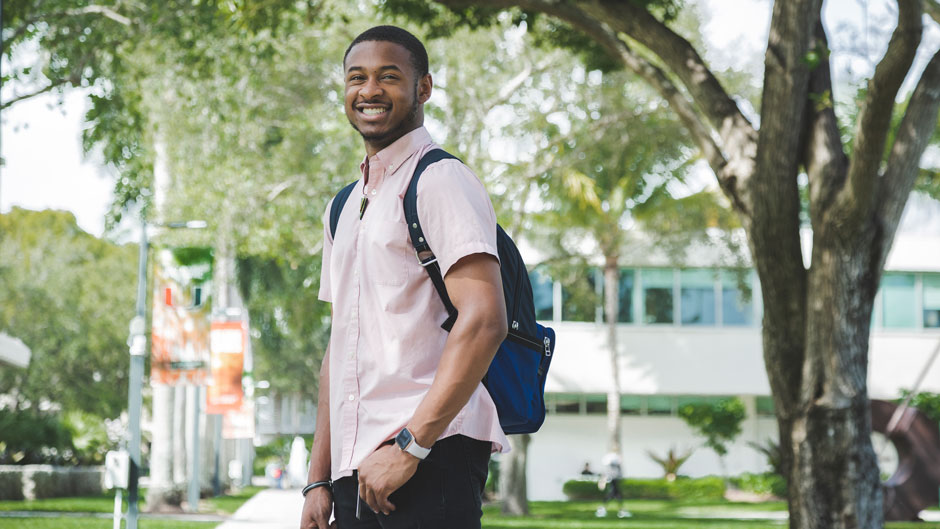
Coles acknowledged that he fills a position with a deep legacy and history of demanding actionable change from the university as he recounted the humble origins of UBS.
Harold Long, the founder and first president of UBS, entered UM as a freshman in the months after the Civil Rights Act of 1964 was put into law. Long and 13 other members of UBS engaged in a sit-in at the Ashe Administration building on May 17, 1968, demanding many of the same things Coles said the university still needs to focus on now, including an increased acceptance rate of Black students and more Black faculty and staff, among other demands.
“Here we are today, still asking for the same representation Harold Long asked for 52 years ago,” Coles said.
Coles, a junior majoring in political science, outlined several experiences he has had where he felt implicit biases against the Black UM community.
“This implicit bias and degree of separation reveals itself in the faintest of ways, almost undetectable if we’re not paying attention,” Coles said, recounting moments he remembers as a MSA staff member dealing with a lack of adequate funding for programming, such as the annual Students of Color Symposium.
Coles said he experienced this same bias when trying to start tough conversations at UM events.
“I have been made to feel apologetic for asking tough diversity-related questions at formal events, when in actuality, these questions are not difficult if the university chooses to act on them,” Coles said.
He also shared that there are several visual reminders on campus which show that the university is not properly advocating for its Black students, including a predominantly White administration.
“The implicit bias reveals itself when a Google search of the university’s administration brings me to a page of professional photos to find an apparent lack of representation with only one brown face in the bottom corner,” Coles said.
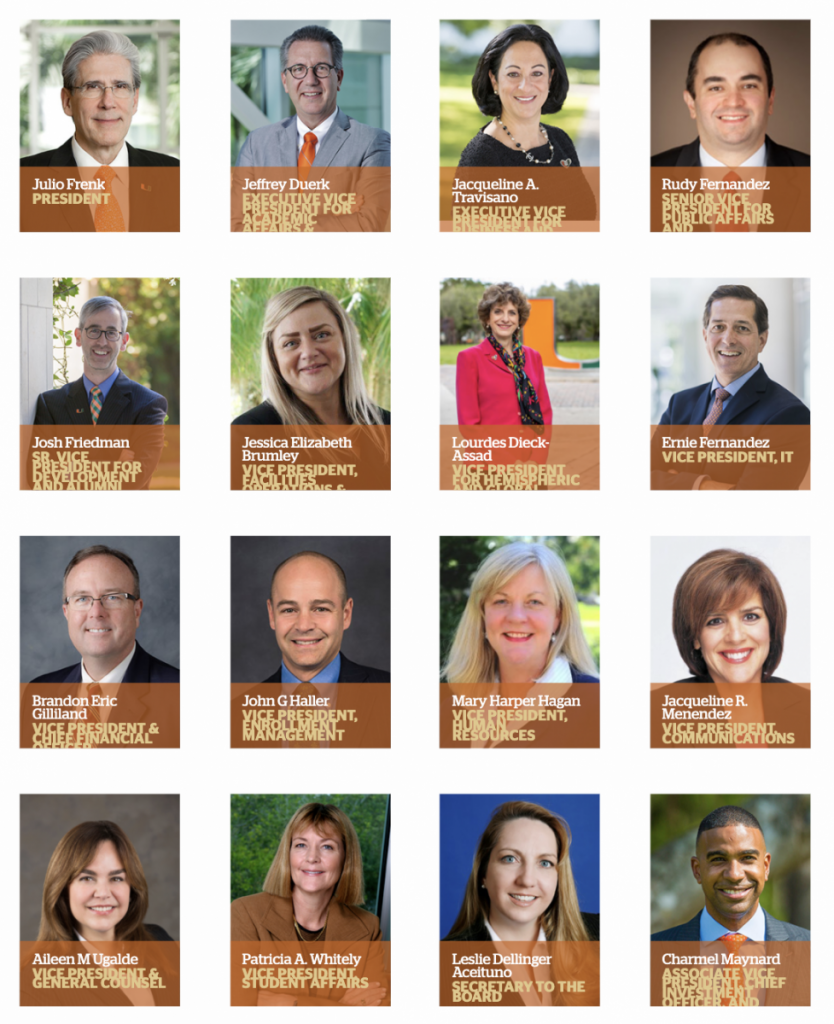
“We are constantly reminded that we exist in a space and on a campus that was not built for us,” Coles continued, adding that this reminder stands seven-stories tall as students pass by Lakeside Village, a $153 million housing project located at the heart of campus on Lake Osceola. “Black students are reminded of our degree of separation every day as we walk by a nine-figure construction project at the core of our campus that many of us cannot hope to afford.”
He challenged the university not just to make statements on social media or over email, but to take action to achieve a more equitable campus community.
Among his ideas is to add an executive vice president for diversity and inclusion, create an Africana studies research center as well as a diversity center, distinct from the Office of Multicultural Student Affairs, that would have a hand in the administration’s hiring and curricula decisions.
Coles explained that progress can be found if UM devotes adequate resources towards addressing inherent issues on campus.
“The University of Miami was not originally founded for anyone who looks like me or anyone who is on this panel,” Coles said. “However, when we address that and try to atone for that with proper resources, proper support and representation at the highest levels of our university, that’s when we break the cycle. When you have voices in those spaces that actually have hands-on policy, and on faculty and staff hires, that’s when you begin to break the cycle.”
SG president shares 3 demands for the administration: More Black faculty and staff, diversity and sensitivity training and a campus-wide survey
About to enter her senior year at UM, Adeleke, the newly-inaugurated Student Government president, shared that she has only had one Black professor so far, while many of her friends have had none.
“Things need to change,” Adeleke said.
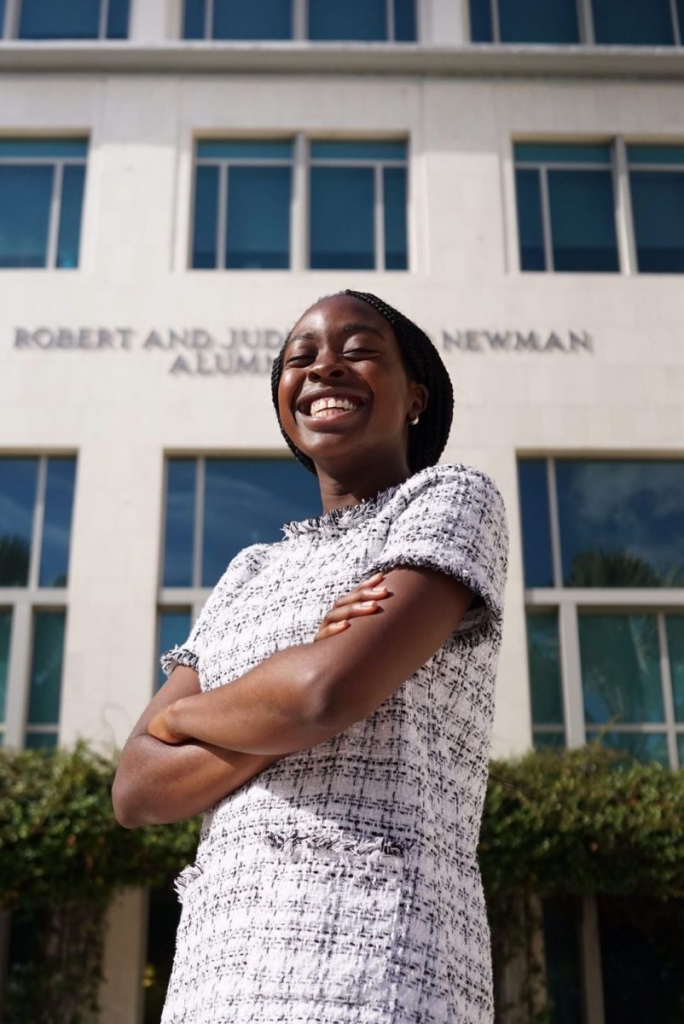
After meeting with other Black student leaders, Adeleke presented three demands to the university Monday night. First among them is to hire more Black faculty and staff.
“In order for us to continue to thrive at the university, be inspired by the work of amazing and diverse leaders and confide in others, we need to increase the diversity of UM by hiring more Black faculty and staff,” Adeleke said. According to College Factual, 10.7 percent of UM’s faculty are Black.
Coles offered praise to Black faculty at UM, stating that many of them walk the campus with grace and style.
“It’s empowering us in more ways than you know,” Coles said.
Adeleke, a senior majoring in journalism and psychology, said that their second demand is to implement a comprehensive diversity and sensitivity training for all students, faculty and staff.
“We all have a part to play in learning more of how we can better interact with one another,” Adeleke continued.
She and other Black student leaders are also asking for a campus racial climate survey to be released to the UM community, so students and leaders can better understand what needs to be addressed at the university.
“In order for us to change and make strides towards a better tomorrow, we need to know what is wrong with our present state,” Adeleke said.
She added that these demands, along with events like the Black State of the Union Address, are only the beginning for what she and other Black student leaders hope to achieve.
“These demands only scratch the surface, and we hope to make more spaces, such as this event, to communicate how we would like to see the university change for the better,” Adeleke said.
Iron Arrow chief urges university to expand policy and procedure for racially biased incidents on campus
Now entering her fifth year at UM, Byrd, the chief of Iron Arrow Honor Society, shared that despite working just as hard as her fellow Canes, she has personally dealt with unjust treatment from professors as well as other UM employees.
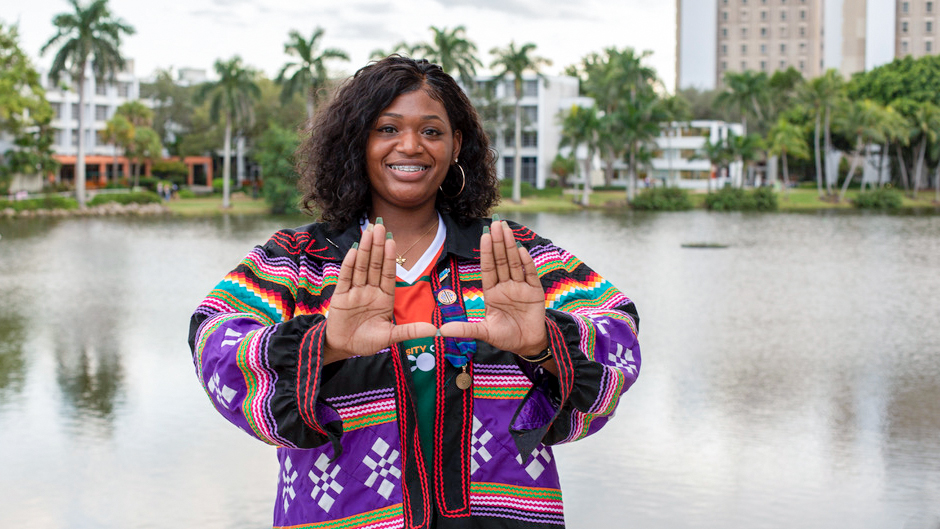
“It should be of no secret or shock that I have experienced professors, faculty and staff overtly making racist comments about myself or others, receiving unfair and unjust treatment, both inside and out of the classroom, and being singled out for things of which I have no control,” said Byrd, a student in the accelerated nursing program.
However, when going to report issues like these, Byrd said the process and consequences for racially biased incidents is unclear.
In the 113-page Student Rights and Responsibilities handbook, there are two paragraphs on bias-related incidents that reaffirm the university’s commitment to a “culture of belonging” and encourage students to report any incidents that occur, stating: “To that end the University is committed to encouraging everyone to report bias incidents that occur in our campus community so that inappropriate and unwelcome behavior may be properly addressed and the community at large can be educated.”
The handbook goes on to define what may be considered a bias incident and states that in cases of unintentional bias-related incidents, a non-disciplinary approach will be taken to educate, while disciplinary action will be taken in intentional incidents.
Byrd insisted, however, that this is not enough. At this point in time, there is no such thing as an unintentional bias-related incident, she said.
“If students and even professors, faculty and staff choose to not educate themselves on the issues at hand, resulting in both overt and covert racist behavior, then that is intentional, and it should be handled as such,” Byrd asserted, calling on the university to lay out a clear set of policies on bias-related incidents as well as procedures for how they can be reported and how they will be addressed.
Students challenge UM’s ‘culture of belonging’
During the moderated discussion, multiple students on the panel made assertions both alluding to and directly challenging the success of UM’s “culture of belonging” initiative, a phrase that has become commonly known among Canes over the past few years.
In 2016, the university set a goal to cultivate a “culture of belonging” as part of the Roadmap to Our New Century, the administration’s vision for the future of UM.
On UM’s Roadmap to Our New Century website, the intentions behind the “culture of belonging” are outlined: “The University will deepen its commitment to diversity and inclusion by building a culture of belonging where all members of the UM community feel valued and can add value.”
However, Coles charged that there are steps that must be taken before this can be achieved.
“We cannot hope to even have a culture of belonging if we cannot first establish a climate of equity and inclusivity,” Coles said, calling on the university to invest in all of its students. “You have to build infrastructure that better supports all of us. Not just some of us. Not just the some whose parents can stroke a $73,000 check but those of us who are leading your organizations, who are gracing your websites and who are leading your student groups across campus.”
Byrd later shared similar sentiments.
“We refuse to continue accepting and standing by aiding a falsified diversity narrative of an institution we chose to attend, disappointed by the many times it did not choose us,” she said, calling on the university to create more spaces where people don’t have to question whether they belong.
Student leaders pledge to use their platform for equity and inclusion and challenge others to do the same
Each of the five panelists pledged Monday afternoon to continue to use their platforms to both speak up and act for change.
“As a Black student leader, I will not be silent,” said Gustave, the first Black president of The President’s 100. “I will use every space that I occupy to make sure that our voice is heard.”
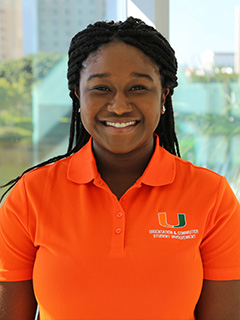
Gustave, a senior majoring in public health, promised to make sure that in her role as president of The President’s 100, a highly selective group of students that act as the face of UM during campus tours and recruitment events, she will pursue diversity in the selection of future ambassadors.
“I plan to be very intentional on who I bring into the organization to make sure that every group of people that is on UM’s campus is represented,” Gustave said.
Telfare, chairwoman of the Homecoming Executive Committee, added that she and the other four panelists cannot advocate alone but require more leaders from UM’s Black community to step up as well.
“There is a need for more Black student leaders on our campus now more than ever,” said Telfare, a junior exercise physiology major. “Leaders who are going to use their platforms to help build a better community for the students who come after us. Leaders who are willing to have those difficult conversations in order to advocate for what they believe in.”
This extends to all students, faculty and staff too, she said.
Adeleke asked viewers to think about what comes after this moment in time and to find what their role can be in this movement.
“What can we as students, leaders, allies and advocates do to make our Hurricane community better for everyone?” Adeleke challenged. “Everyone, yes, everyone, has a part to play in making sure that our community is safe.”
She encouraged all Canes to take this time to listen, educate and advocate.
“Sometimes in your spheres of influence, it’s easier to stay silent, but oftentimes, we need to have these tough conversations,” she said. “Whether you have 300 followers or over 1,000, your voice matters, and you have a circle of influence of people that will listen to you and respect you.”
However, while statements declaring support for the Black community and solidarity in this moment of pain shared via email, social media and elsewhere are important, Coles said, they are not enough.
“It will all be meaningless if we don’t follow it up with actual tangible action in this moment,” Coles said. “To every faculty, staff or student ally on this call, now is the challenge, now following this conversation is when we gotta get down to business, where we really have to put our words to action.”
The university responds to student concerns
Following Monday night’s event, Patricia Whitely, vice president for student affairs, sent a statement to The Miami Hurricane commending the students who spoke at the Black State of the Union Address.
“The student leaders did an outstanding job presenting some of the issues they are concerned about at the University of Miami,” Whitely said. She confirmed that the university administration is already getting to work to address many of the concerns that were raised by the panelists, including a reviewal of the bias policy in the Student Rights and Responsibilities handbook and funding for the Students of Color Symposium.
Whitely also affirmed that action will continue, stating, “The University of Miami values the diversity of our student body, and we will continue to work with our students of color to address the issues that were raised Monday.”





